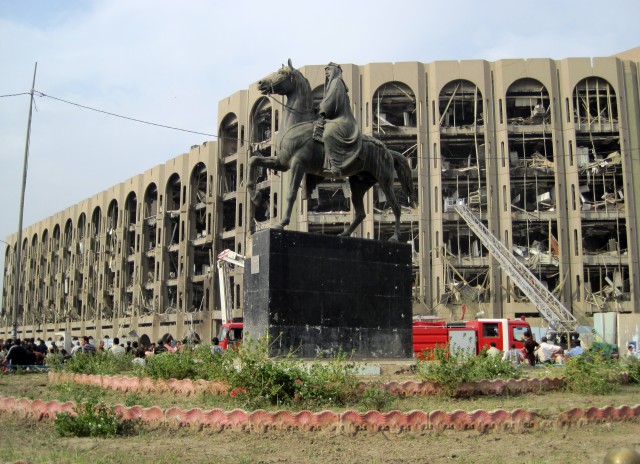
BAGHDAD — Suicide bombers in cars packed with explosives killed at least 132 people and wounded 600 more outside Iraqi government buildings Sunday morning in nearly simultaneous blasts that were powerful even by Baghdad’s
grim standards.
The bombings made Sunday the deadliest day in Iraq since
April 2007, according to casualty figures released by Iraqi authorities, and
they drew particular outrage because they struck at cabinet ministries and city
government offices that are supposed to be especially secure.
One of the explosions also ruptured a water line, causing a
flood that turned red as it mixed with blood. Corpses bobbed underwater and
dangled from rooftops. An Iraqi soldier fainted at the scene upon hearing eight
of his comrades had died.
“This is unbearable; this is criminal,” said
Mahmoud al-Fahmawi, an ambulance driver who collected jaws, a heart and other
body parts from the scene. “God didn’t order jihad as this. Jihad is not
killing or bombing innocents.”
Iraqi authorities said Sunday’s bombings appear to have been
carried out by two suicide attackers in cars or trucks that exploded almost
simultaneously at around 10:30 a.m. Sunday, the first day of the workweek in
Iraq. The timing was devastating, both for the scores of ordinary Iraqis who
were killed en masse as they arrived at their jobs and for the Iraqi
government, which has been trying to address security and political problems in
time for January elections.
American and Iraqi officials were hoping for a calm election
season that would pave the way for a swift U.S. withdrawal from Iraq, but a
political stalemate over election laws and the insurgents’ continued ability to
exploit the Iraqi government’s vulnerabilities are potential spoilers. Now the
January polls are in jeopardy, along with the Obama administration’s goal of
leaving behind a much more stable Iraq than the weak, violence-ridden nation of
recent years.
“The United States will stand with Iraq’s people and
government as a close friend and partner as Iraqis prepare for elections early
next year, continue to take responsibility for their future, and build greater
peace and opportunity,” President Barack Obama said in a statement that
condemned the bombings.
Iraqi Prime Minister Nouri al-Maliki’s administration was
still reeling from twin truck bombings in August that killed about 100 people
outside state offices. Together with Sunday’s similar attack, insurgents have
now rendered four key government buildings — the ministries of justice,
finance, foreign affairs and municipalities — uninhabitable.
Al-Maliki, a Shiite Muslim, released a statement blaming
elements of Saddam Hussein’s predominantly Sunni Baath Party and militants from
al-Qaida in Iraq for the attack. As of late Sunday, no group had claimed
responsibility.
A somber al-Maliki visited the scene of Sunday’s attacks
within hours, perhaps mindful of the criticism he received after he failed for
days to tour the site of the August bombings.
{::PAGEBREAK::}
Although he remains popular with Iraqis, who consider him a
less sectarian figure than some other prominent Shiite political leaders,
al-Maliki faces a fearful constituency and security forces that still rely
heavily on U.S. military assistance despite security improvements this year.
U.S. Marines arrived at the scene of Sunday’s attack with
Iraqi forces, in accordance with a U.S.-Iraq security pact that requires
American forces to coordinate with their Iraqi counterparts before getting
involved in combat or other operations. Americans at the scene asked Iraqi
security guards for surveillance videos from buildings in the area, and
investigators took soil samples and carted off pieces of twisted metal.
“The challenge is that we don’t own heavy rescue
equipment,” said Iraqi Gen. Abdul Rasul al-Zaidi, the commander of the
Baghdad civil defense force, who toured the site. “Secondly, it’s hard for
our men to arrive quickly to the sites of incidents because of
checkpoints.”
In interviews, residents and workers near the bombing sites
said the attacks were politically motivated, required collusion from the
security forces and were intended to bring down the al-Maliki government before
the January elections.
“Look at all these checkpoints surrounding us, so how
did these cars enter?” asked Radhi al-Aboudi, 50. “This government
will never protect Iraq. Politicians seek office to live in luxury, so it’s
impossible for this government or the incoming one to protect the
country.”
Ahmed Hussein, a carpenter who found a corpse on top of his
workshop after the bombing, said he was disgusted with the heavy security
presence that appears only after a massive attack.
“Where are all these soldiers before the
bombings?” Hussein asked. “Some things make me furious with our
security forces. They ask us silly questions at checkpoints: Where did you come
from and where are you going? Then they ask what’s in the back trunk — as if
there’s no other place to hide explosives.”
Via McClatchy-Tribune News Service.













